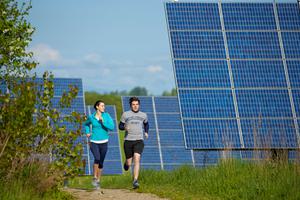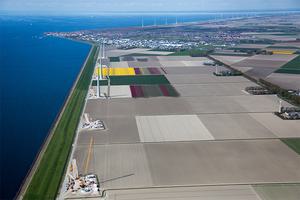In Solutions
Innovation
-
Natural Aquaculture
Can We Save the Oceans By Farming Them?
-
High Stakes on the High Seas
A Growing Call for International Marine Reserves
-
Video Contest Winner - Runner Up
Chocolate in the Jungle: The Battle To Save a Disappearing Rainforest
-
Rethinking Urban Landscapes To Adapt to Rising Sea Levels
Landscape architect Kristina Hill focuses on helping cities adapt to climate change, particularly sea level rise. In an interview with Yale Environment 360, she discusses the challenges, solutions, and costs of saving cities from encroaching oceans.
-
Surge in Renewables Remakes California’s Energy Landscape
Thanks to favorable geography, innovative government policies, and businesses that see the benefits of clean energy investments, California is closing in on its goal of generating a third of its electricity from renewables by 2020.
-
In the Sagebrush Marketplace, A New Way to Protect Species
In the American West, where sage grouse populations have plummeted, conservationists, ranchers, and oil and gas companies are taking part in an experiment in which private landowners are paid to protect and restore critical habitat for the beleaguered bird.
-
Designing Wetlands to Remove Drugs and Chemical Pollutants
Drinking water supplies around the world often contain trace amounts of pharmaceuticals and synthetic compounds that may be harmful to human health. One solution being tried in the U.S. and Europe is to construct man-made wetlands that naturally degrade these contaminants.
-
Perennial Rice: In Search of a Greener, Hardier Staple Crop
Scientists have long sought to create a perennial rice that would avoid the damage to the land caused by the necessity of planting annually. Now, Chinese researchers appear close to developing this new breed of rice, an achievement that could have major environmental benefits.
-
Agricultural Movement Tackles Challenges of a Warming World
With temperatures rising and extreme weather becoming more frequent, the “climate-smart agriculture” campaign is using a host of measures — from new planting practices to improved water management — to keep farmers ahead of the disruptive impacts of climate change.
-
How Technology Is Protecting World’s Richest Marine Reserve
After years of fitful starts, the Pacific island nation of Kiribati this month banned all commercial fishing inside its huge marine reserve. New satellite transponder technology is now helping ensure that the ban succeeds in keeping out the big fishing fleets.
-
To Tackle Runoff, Cities Turn to Green Initiatives
Urban stormwater runoff is a serious problem, overloading sewage treatment plants and polluting waterways. Now, various U.S. cities are creating innovative green infrastructure — such as rain gardens and roadside plantings — that mimics the way nature collects and cleanses water.
-
Designing the Urban Landscape To Meet 21st Century Challenges
Martha Schwartz, a professor at Harvard’s Graduate School of Design, explains in a Yale Environment 360 interview how creative landscape architecture can help cities become models of sustainability in a world facing daunting environmental challenges.
-
A Scientist Extols the Value Of Forests Shaped by Humans
Political ecologist Susanna Hecht has incurred the wrath of some conservationists by arguing that the notion of the primeval forest is largely a myth and that disturbed forests play a vital ecological function. In an interview with Yale Environment 360, she makes the case for a “new rurality” that places less emphasis on protected forests and more on the areas where people live.









